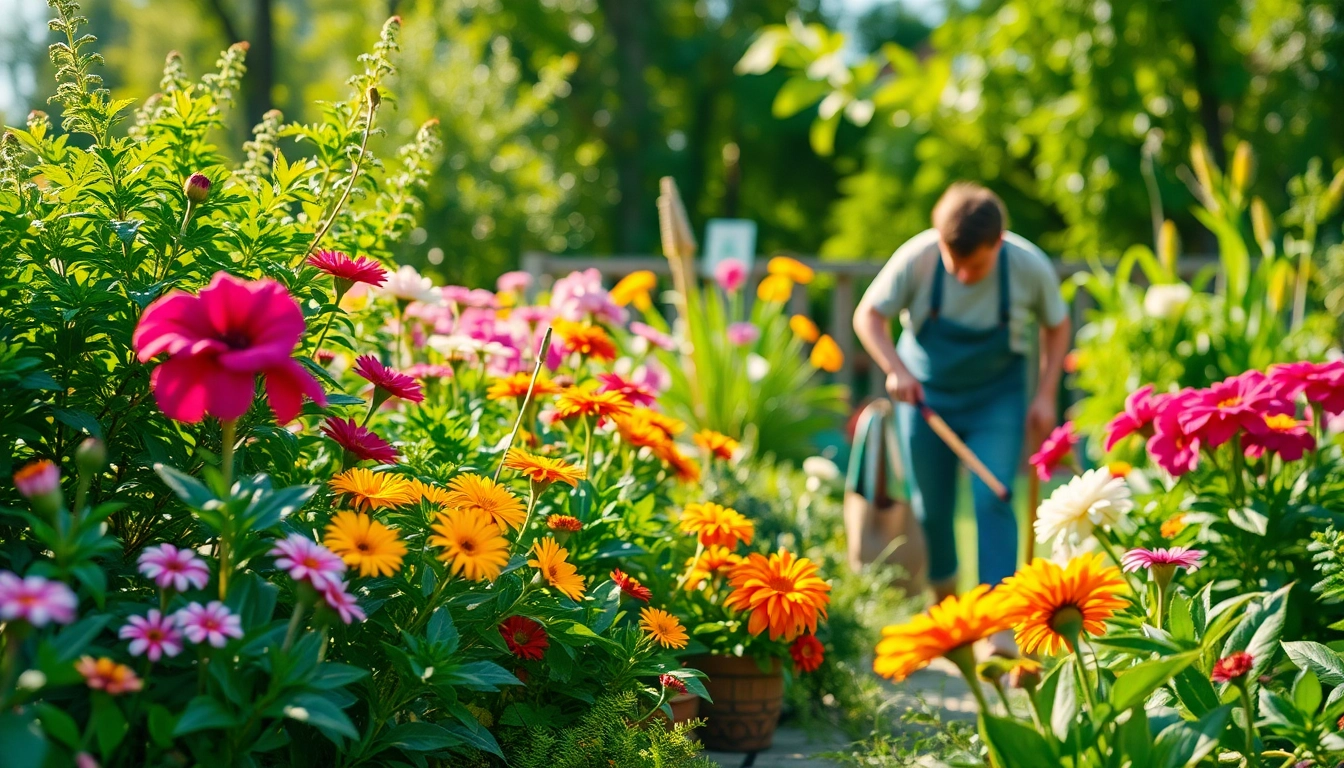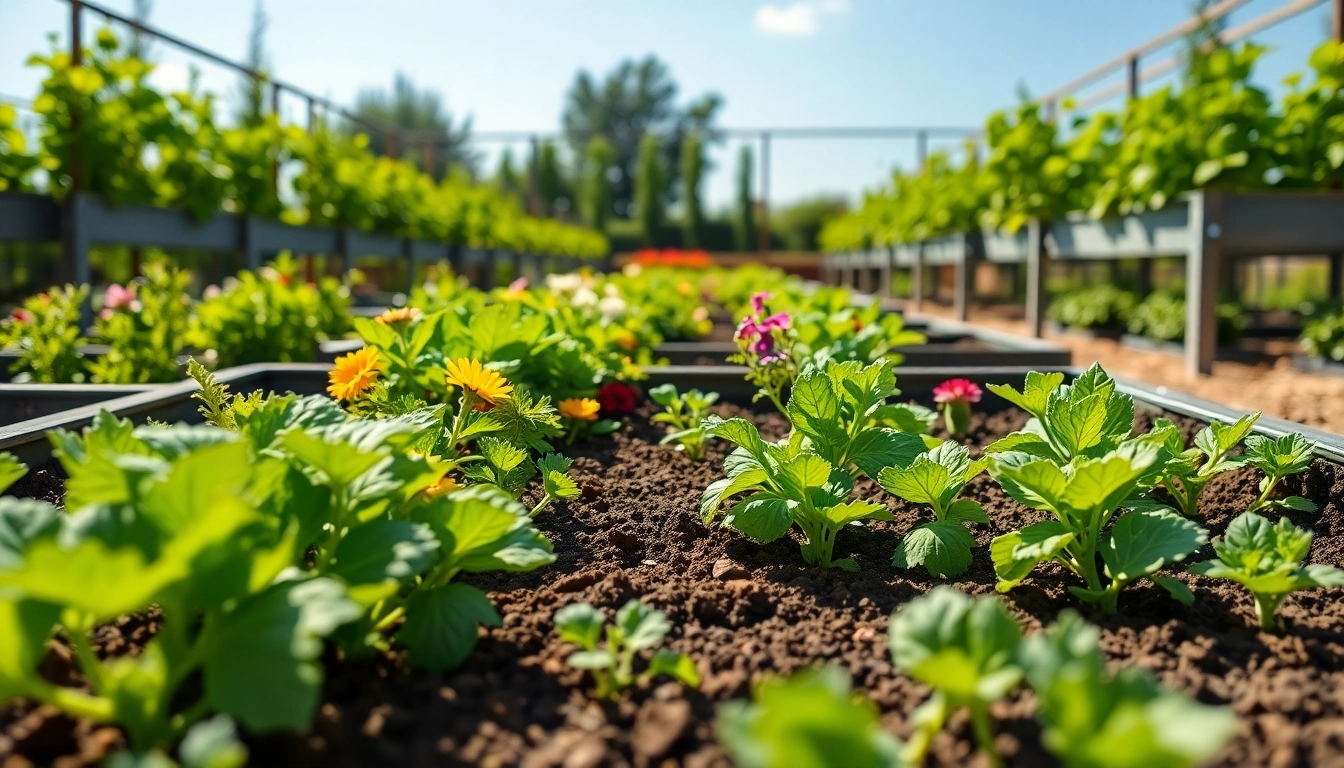Understanding Garden Maintenance Services
What is Garden Maintenance?
Garden maintenance refers to the systematic and holistic approach taken to care for outdoor gardens and landscapes. It encompasses various tasks aimed at enhancing the aesthetics, health, and functionality of garden spaces. From lawn care to pruning shrubs, the process promotes longevity and vitality in plants and overall garden design. A quality garden maintenance service will typically employ professionals who are knowledgeable about horticulture and landscape design to ensure that gardens remain thriving throughout the seasons.
Common Services Offered
Garden maintenance services can vary significantly depending on the provider, but common offerings typically include:
- Lawn Care: Mowing, aerating, fertilizing, and seasonal treatments to ensure a healthy lawn.
- Plant Care: Planting, feeding, pruning, and removing dead plants or weeds.
- Landscaping: Design and installation of new beds, pathways, patios, and decorative elements.
- Irrigation System Installation and Maintenance: Setting up and maintaining watering systems to ensure plants get the required hydration.
- Mulching: Applying mulch to garden beds to retain moisture, suppress weeds, and enhance the visual appeal.
The Importance of Regular Maintenance
Regular maintenance is essential for the long-term health and appearance of any garden. Without consistent care, gardens can quickly become overrun with weeds, pests, and diseases that can lead to the decline of plants. An ongoing maintenance schedule helps to:
- Prevent the spread of diseases and pest infestations.
- Ensure proper growth and blooming cycles in plants.
- Enhance the property’s curb appeal and increase property value.
- Create a healthier ecosystem that sustains native plants and beneficial insects.
Choosing the Right Garden Maintenance Service
Key Factors to Consider
Selecting the right garden maintenance service requires careful consideration of several factors to ensure that the provider aligns with your needs:
- Experience and Expertise: Look for companies with a solid track record and knowledgeable staff who understand local flora and gardening techniques.
- Services Offered: Ensure the company provides a comprehensive range of services that match your specific garden needs.
- Reputation: Check for customer reviews and consider seeking testimonials to gauge the quality of service.
- Certifications: Verify if the service provider has the appropriate licenses, insurance, and certifications for garden maintenance.
Questions to Ask Service Providers
Having a list of questions can help you evaluate potential garden maintenance services effectively:
- What types of garden maintenance services do you provide?
- Do you offer personalized service plans based on specific garden needs?
- How do you handle pest control and the use of chemicals?
- What are your labor and equipment costs, and do you provide free estimates?
- Can you provide references from past clients?
Assessing Your Garden’s Specific Needs
Understanding your garden’s unique requirements is crucial in choosing a maintenance service. Before making a decision, consider the following aspects:
- Garden Size and Layout: Larger gardens may require more extensive services.
- Types of Plants: Different plants have varying needs, and your service should cater to them.
- Climate Considerations: Knowledge about local weather patterns can significantly affect care schedules.
- Current Condition: Identify which areas need more attention and prioritize those services in your maintenance plan.
Best Practices for Maintaining Your Garden
Seasonal Maintenance Checklists
Each season presents unique challenges and opportunities for garden maintenance. Here’s a breakdown of essential tasks to consider:
Spring
- Clean up debris and dead plant material.
- Start fertilizing and mulching to prepare for the summer.
- Prune perennials and trees as necessary.
Summer
- Water consistently, considering irrigation needs.
- Regularly mow and trim for neat appearance.
- Monitor for pests and diseases actively.
Autumn
- Set up a leaf cleanup routine.
- Prepare for winter by mulching and planting cover crops.
- Evaluate the health of the plants and note any changes needed for the next year.
Winter
- Conduct maintenance on tools and equipment.
- Assess garden design plans for upcoming seasons.
- Take care of any cold-sensitive plants.
DIY Tips for Homeowners
For homeowners interested in maintaining their gardens without professional help, several simple yet effective tips can enhance your gardening journey:
- Know Your Plants: Research the specific needs of each plant type in your garden.
- Invest in Quality Tools: Using the right equipment makes tasks easier and can prevent plant damage.
- Practice Regular Observations: Monitor your garden routinely for signs of stress or damage.
- Stay Informed: Keep updated with local gardening workshops or online resources to learn new techniques.
Signs Your Garden Needs Professional Help
While homeowners can handle routine maintenance, certain signs indicate it may be time to consult professionals:
- Declining Plant Health: If plants are wilting or showing stunted growth despite proper care, it may signal underlying issues.
- Pest Infestations: Finding pests that you can’t manage indicates a more specialized approach is required.
- Overgrown Areas: Parts of the garden that are neglected and becoming unmanageable can benefit from professional attention.
- Complex Landscaping projects: Ambitious designs may necessitate advanced skills and knowledge.
Cost and Budgeting for Garden Maintenance
Understanding Pricing Models
The cost of garden maintenance can vary widely, depending on services needed, garden size, and provider experience. Common pricing models include:
- Hourly Rates: Some providers charge based on the hours worked, which may be suitable for smaller projects.
- Flat Fees: Fixed costs for specific services provide predictability in budgeting.
- Monthly Contracts: Subscription models offer ongoing services and are often more economical for larger gardens.
How to Estimate Your Budget
Developing a realistic budget for garden maintenance involves several steps:
- Evaluate Your Needs: Determine which services are essential based on your garden’s condition.
- Research Costs: Obtain quotes from multiple service providers to gauge market rates.
- Factor In Additional Costs: Remember to include costs for potential seeds, plants, or materials needed over time.
- Adjust for Seasonal Variations: Certain seasons may require more intensive care, affecting costs.
Comparing Costs Among Service Providers
Before committing to a garden maintenance service, it’s crucial to compare costs and services thoroughly:
- Obtain Written Estimates: Get detailed quotes outlining services included.
- Check for Hidden Fees: Ensure that all potential additional costs are discussed upfront.
- Evaluate Value Over Price: The cheapest option may not provide the best quality of service. Look for providers with a good balance of cost and service quality.
Long-Term Benefits of Professional Garden Maintenance
Enhancing Property Value
Well-maintained gardens add significant value to properties. Homebuyers often seek out homes with attractive landscaping as it enhances overall appeal. Regular maintenance helps to:
- Improve curb appeal, making properties easier to sell.
- Lower long-term costs associated with neglect and deterioration.
- Provide a sense of pride, making homeowners feel more connected to their property.
Creating a Sustainable Garden
Professional garden maintenance services can also promote environmental sustainability. By choosing eco-friendly practices, you can develop a garden that is not only beautiful but also sustainable. Some aspects include:
- Using organic fertilizers and pest control methods.
- Incorporating native plants that require less water and care.
- Implementing xeriscaping techniques to reduce water use.
Enjoying a Stress-Free Gardening Experience
Hiring a professional service allows homeowners to enjoy their gardens without the stress of ongoing upkeep. With trained specialists handling the hard work, residents can:
- Focus on enjoying their space rather than worrying about weeds and pests.
- Benefit from expert insights and seasonal recommendations.
- Build a routine that aligns with personal schedules, allowing flexibility.















Leave a Reply